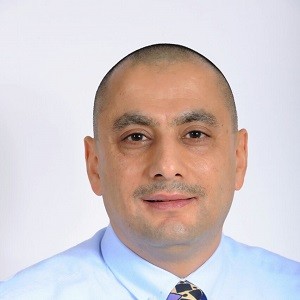About Conference
We are delighted to extend our heartfelt welcome to the 19th International Conference on Allergy and Clinical Immunology, an event that serves as a beacon of knowledge, innovation, and collaboration in Allergy and Immunology. It gives us immense pleasure to host this gathering of brilliant minds, thought leaders, and experts from around the globe.
Allergy 2024 conference welcomes delegates and participants from across the globe to join us for the 19th International Conference on Allergy and Clinical Immunology, taking place on September 12-13, 2024 at Paris, France [Hybrid Event]. This conference will be a platform to explore the theme "From Basic Immune Understanding to Latest Immunology Progressions".


Our program features lectures designed to showcase emerging and novel therapies in Allergy and Clinical Immunology, covering a wide range of topics including Allergy and Immunology, Allergic Rhinitis, Food Allergy and Drug Allergy, Immune System and Allergic Reactions, Asthma, Immune Disorders, Allergy and Inflammation, Immunopathology of COVID-19, Clinical Immunology, Developmental Immunology, Immunotherapy, Behavioural Immunity, Cancer Immunology, and much more.
Attendees will have access to exclusive sessions and panel discussions covering the latest innovations in Advanced Allergy treatments and Immune disorder therapeutics through:
-
Engaging lectures delivered by esteemed speakers
-
Keynote forums featuring prominent professors and doctors
-
Open Innovation Challenges
-
Poster presentations by young researchers
-
Global networking sessions connecting participants from over 50 countries
-
Introduction to novel techniques to enhance research
-
Opportunities for global business connections and networking
-
Interaction with editors of referred journals and members of societies and associations worldwide
-
A prime platform for showcasing the latest products and formulations in the Allergy & Clinical Immunology field
Target Audience:
-
Allergists
-
Immunologists
-
Clinical Immunologists
-
Researchers in Allergy and Immunology
-
Physicians specializing in Allergy and Immunology
-
Immunology Laboratory Professionals
-
Immunotherapy Specialists
-
Pharmaceutical Professionals
-
Academicians and Educators in Allergy and Immunology
-
Students pursuing studies in Allergy and Immunology
Sessions
This track focuses on understanding the underlying immunological mechanisms that drive allergic diseases such as asthma, allergic rhinitis, atopic dermatitis, and food allergies.
-
Cellular and molecular mechanisms of allergic sensitization
-
Allergen recognition and immune response
-
Immunological basis of allergic inflammation
This track explores innovative strategies and treatments for managing allergic conditions, including novel drugs, immunotherapies, and biologics.
-
Immunomodulatory therapies for allergy prevention and treatment
-
Biologic agents targeting allergic pathways
-
Personalized medicine approaches for allergic disease management
This track delves into the mechanisms underlying primary and secondary immunodeficiencies, including genetic defects, immune dysregulation, and infectious causes.
-
Primary immunodeficiencies: genetic and molecular basis
-
Secondary immunodeficiencies: acquired causes and mechanisms
-
Immunodeficiency-associated complications and management
This track explores strategies for modulating the immune system to prevent or treat allergic diseases, including immunotherapy, probiotics, and dietary interventions.
-
Immunotherapy approaches for allergic desensitization
-
Probiotics and microbiome modulation in allergy prevention
-
Dietary factors influencing immune regulation and allergic responses
This track highlights recent advancements in molecular immunology relevant to allergic diseases, including cytokine signaling, immune cell activation, and gene regulation.
-
Cytokine networks in allergic inflammation
-
Immune cell signaling pathways in allergy and asthma
-
Epigenetic regulation of allergic immune responses
This track focuses on the identification, characterization, and standardization of allergens from various sources, including foods, pollen, dust mites, and insects.
-
Allergen structure and function
-
Allergenicity assessment and measurement techniques
-
Allergen component-resolved diagnostics
This track examines the efficacy, safety, and mechanisms of allergen-specific immunotherapy (AIT) and other immunomodulatory therapies for allergic disorders.
-
Subcutaneous and sublingual immunotherapy
-
Novel approaches in allergen-specific immunotherapy
-
Immunomodulatory mechanisms of AIT
This track explores the genetic basis of allergic diseases, including genome-wide association studies (GWAS), genetic polymorphisms, and gene-environment interactions.
-
Genetic risk factors for allergic disorders
-
Immunogenetic determinants of asthma, atopic dermatitis, and allergic rhinitis
-
Gene-environment interactions in allergic susceptibility
This track investigates the complex interactions between the microbiota and the immune system in the development and modulation of allergic diseases.
-
Gut microbiota composition and allergic sensitization
-
Microbiota-host immune interactions in allergy and asthma
-
Therapeutic targeting of the microbiota in allergic disorders
This track explores the immunological mechanisms underlying autoimmune diseases and their relationship with allergic disorders, including autoantibody production, T-cell dysregulation, and immune tolerance.
-
Immunopathogenesis of autoimmune diseases
-
Shared mechanisms between autoimmunity and allergy
-
Immunomodulatory therapies for autoimmune-related allergic manifestations
This track focuses on the identification and validation of biomarkers for the diagnosis, prognosis, and monitoring of allergic diseases, as well as their utility in guiding therapeutic decisions.
-
Serum and cellular biomarkers in allergic diseases
-
Biomarker panels for allergic phenotyping and endotyping
-
Biomarker-driven approaches to personalized allergy management
This track examines the immunological mechanisms underlying food allergy, including oral tolerance, food sensitization, and immune responses to dietary antigens.
-
Gut immunology and food allergy development
-
Immunopathogenesis of IgE-mediated and non-IgE-mediated food allergies
-
Diagnostic and therapeutic approaches to food allergy management
This track explores the immunological mechanisms underlying vaccine responses and the impact of vaccines on allergic diseases, including vaccine adjuvants, immune memory, and vaccine safety.
-
Immunogenicity and efficacy of vaccines in allergic individuals
-
Vaccine-induced immune modulation and allergic outcomes
-
Vaccination strategies for allergic populations
This track investigates the inflammatory pathways involved in asthma and allergic rhinitis, including type 2 inflammation, airway remodeling, and the role of epithelial cells.
-
Type 2 cytokines and effector cells in asthma and allergic rhinitis
-
Airway epithelial barrier dysfunction in allergic airway diseases
-
Targeting inflammatory pathways for asthma and allergic rhinitis therapy
This track focuses on the immunological mechanisms underlying drug allergies, including immediate hypersensitivity reactions, delayed-type hypersensitivity, and drug-specific immune responses.
-
Drug allergens and haptenation mechanisms
-
Immunological testing for drug allergy diagnosis
-
Management and desensitization strategies for drug allergic patients
This track presents real-world case studies highlighting challenging diagnostic dilemmas, treatment decisions, and management strategies for various allergic disorders.
-
Pediatric allergy case studies
-
Adult allergy case studies
-
Multidisciplinary approaches to complex allergy cases
This track showcases ongoing and completed clinical trials investigating novel therapies, diagnostic approaches, and preventive strategies for allergic diseases and immunodeficiencies.
-
Phase I-IV clinical trials in allergy and immunology
-
Translational research bridging bench to bedside in allergic disorders
-
Regulatory considerations and challenges in allergy clinical research
This track focuses on epidemiological studies investigating the prevalence, incidence, risk factors, and trends of allergic diseases and immunodeficiencies at the population level.
-
Global burden of allergic diseases
-
Environmental factors influencing allergic disease epidemiology
-
Socioeconomic disparities in allergic disease prevalence and outcomes
This track examines the integration of digital health technologies, telemedicine platforms, mobile applications, and wearable devices in allergy diagnosis, management, and patient education.
-
Teleconsultation and remote monitoring for allergic patients
-
Mobile health apps for allergy symptom tracking and management
-
Artificial intelligence and machine learning in allergy diagnosis and risk prediction
Market Analysis
Immunology, a crucial medical discipline, focuses on immune system disorders like allergies, autoimmune diseases, AIDS, and inflammation. Immunologists diagnose and treat these conditions, studying immune system dysfunctions. Distinct expertise is required for adult and pediatric immunology due to differences in care needs. While adult immunologists specialize in treating adults, pediatric immunologists focus on children. This specialization ensures tailored care for each age group. Immunology branches into clinical, fetal/neonatal, pediatric, and other specialized fields. Each subfield addresses specific categories and applications within the immune system. Overall, immunology plays a vital role in understanding and managing immune-related ailments across diverse patient populations.
The surge in allergy and immune disorders has expanded immunology research across various sectors, prompting participation from numerous entities including companies, institutes, hospitals, and professionals from diverse biological fields such as pediatrics, cellular biology, and pathology. The collective involvement and contributions of these stakeholders are visually represented in the accompanying graph.

Market analysis of Allergy Immunotherapy
Allergy Immunotherapy is a treatment approach for allergic diseases such as allergic rhinitis (hay fever) and allergic asthma. Allergy immunotherapy involves exposing patients to gradually increasing doses of allergens to desensitize their immune system and reduce allergic reactions.
The market for allergy immunotherapy has shown consistent growth over the past few years, with a compound annual growth rate (CAGR) of approximately 8-10%. This growth trajectory is expected to continue in the coming years as the demand for effective allergy treatments remains strong and as new advancements in immunotherapy technology emerge.

List of few worldwide societies:
-
Algerian Society of Allergy and Clinical Immunology
-
American Association of Immunologists
-
Argentine Association of Allergy and Immunology
-
Australasian Society of Clinical Immunology and Allergy
-
Austrian Society for Allergology and Immunology
-
Bangladesh Society of Allergy and Immunology
-
British Society of Allergy and Clinical Immunology
-
Brazilian Association of Allergy and Immunology
-
Bulgarian Society for Immunology
-
Canadian Society of Allergy and Clinical Immunology
-
Chinese Society of Allergology
-
Croatian Society for Allergology and Clinical Immunology
-
Danish Asthma and Allergy Association
-
Egyptian Society of Allergy and Clinical Immunology
-
European Federation of Immunological Societies
-
Federation of African Immunological Societies
-
Finnish Society of Allergology and Clinical Immunology
-
French Society of Allergy and Clinical Immunology
-
German Society for Allergology and Clinical Immunology
-
Georgian Association of Allergology and Clinical Immunology
-
Hellenic Society of Immunology
-
Hong Kong Allergy Association
-
Hungarian Society for Immunology
-
Iranian Society for Immunology and Allergy
-
Israel Association of Allergy and Clinical Immunology
-
Indonesian Society of Allergy and Immunology
-
Indian Academy of Allergy
-
Italian Society of Allergology and Clinical Immunology
-
Japanese Society for Immunology
-
Japanese Society of Allergology
-
Kenya Allergy Society
-
Kosovo Allergy Asthma and Immunology Association
-
Korean Association of Immunologists
-
Korean Academy of Asthma, Allergy and Clinical Immunology
-
Lebanese Society of Allergy and Immunology
-
Saudi Allergy Asthma & Immunology Society
-
South Africa Allergy Society
-
Spanish Society of Allergology and Clinical Immunology
-
Swiss Society for Allergology and Immunology
-
Swedish Association for Allergology
-
Tanzania Immunology Society
-
Turkish National Society of Allergy and Clinical Immunology
Worldwide Hospitals:
-
University Hospital Austral
-
RP Medical Center
-
British Hospital
-
Italian Hospital
-
St Vincent's Hospital
-
The Royal Children's Hospital
-
Royal Prince Alfred Hospital-Immunology
-
John Hunter Hospital Immunology & Infectious Diseases Unit
-
Canberra Hospital
-
John James Medical Centre
-
Kuopio University Hospital
-
Turku University Hospital
-
CHP Saint-Grégoire
-
American Hospital of Paris
-
Angers University Hospital
-
Hôpital de Hautepierre
-
Hôtel-Dieu de Paris
-
US Navy Hospital
-
Bambino Gesù Hospital
-
Hospital of Santa Maria Nuova
-
Niguarda Ca 'Granda Hospital
-
Timberland Medical Centre
-
Island Hospital
-
Juarez Hospital in Mexico
-
Hospital Velmar
-
Galenia Hospital
-
Hospital Angeles
-
Salutaris Medical Center
-
Academic Medical Centre
-
Academic Hospital Maastricht
-
Erasmus MC
-
Radboudumc
-
UMC Utrecht
-
Amsterdam Rheumatology & Immunology Center
-
Asan Medical Center
-
Central Clinical Hospital, Katowice
-
GMS Clinic Yamskaya
-
American Medical Clinic
-
Avcilar Hospital
Abstract Submission Guidelines
Abstract Submission Guidelines
-
Abstracts can be submitted through the online link ABSTRACT SUBMISSION
-
Abstracts must be submitted in English and should be within 250-300 words along with a biography of the presenter of 60-70 words
-
Submissions are welcome in all topics related to Allergy and Immunology.
-
Presenting author shall provide the following details: Full name of the presenter, Affiliation details: department, institution/hospital, country, Phone number & E-mail address and photograph
-
For Co-authors following details are required: Full names and affiliation details like department, institute/ organization name, and country shall be included
-
All abstracts will be reviewed by a review panel approved by the Alergy 2024 Conference Review Committee.
-
All presenters of accepted abstracts will be required to register and pay for attendance at the Conference.
Visa Guidelines
Visa Guidelines
Allergy 2024 organizing committee hereby reiterates that we are NOT involved in VISA processing. We can assist by providing supporting documents like a Letter of invitation, Letter of Abstract Acceptance and Registration Payment Receipt.
You may be required to submit additional documents along with these documents to the embassy.
Letter of Invitation: The official Letter of Invitation is proof that your submitted paper and registration application are accepted by the conference committee board. It will be stated in English and may help you with your visa application.
Only registered participants will get an official letter of invitation
Attendees need to finish Registration & Authenticated information submission to get an official letter of invitation [i.e., Passport (Scan copy), DOB, Mobile Number, Physical Address and Photograph].
Contact the program manager for more information
Official Letters of Invitation will be provided only to attend the conference.
Participation Options
-
Keynote speaker: 45-50 minutes
-
Speaker (oral presentation): 25-30 minutes
-
Speaker (workshop): 45-50 minutes
-
Speaker (special session): 45-50 minutes
-
Delegate (only registration): Will have access to all the sessions with all the benefits of registration
-
Poster presenter : Can present a poster and enjoy the benefits of delegate
-
Remote attendance: Can participate via video presentation or e-poster presentation
-
Exhibitor: Can exhibit his/her company’s products by booking exhibitor booths of different sizes
-
Media partner
-
Sponsor
-
Collaborator
Past Conference report
We would like to thank all of our wonderful and eminent speakers, conference attendees who had shared their research knowledge and made Allergy 2023 Conference as memorable and our best event ever!
18th International Conference on Allergy and Clinical Immunology, hosted by the Conference Series LLC LTD was held June 08, 2023 as a webinar, with the theme was “Rear most Inventions in the Field of Allergy & Clinical Immunology”. The main ambition of Allergy 2023 was to came up with an international program for Medicinal Researchers, Immunologist, Healthcare Professionals. Benevolent responed and activily participated by the Editorial Board Members of Conference Series Journals as well as from the Pediatric Nurses, Doctors, Pediatric Professors, Pharmaceutical Industries, Researchers and Students from Various fields of Allergy 2023, who all are made the event grant success.
The meeting had presented on various sessions, in which they were disscussed on the following major scientific tracks:
-
Coronavirus and SARS
-
Mislike and Inflammation
-
Immune System and Antipathetic responses
-
Immune Diseases
-
Food Allergy and Drug Allergy
-
Immunotherapy and Behavioural impunity
-
Clinical Immunology
-
Developmental Immunology
-
Cancer Immunology
-
Immunopathology of COVID 19
-
Antipathetic Rhinitis
-
Anaphylaxis and Asthma
-
Vaccination and Immunisation
-
Autoimmune conditions
With the grand success of Allergy 2023, Conference Series is proud to announce 19th International Conference on Allergy and Clinical Immunology September 12-13, 2024 Paris, France [Hybrid Event]
Let’s meet @ Allergy 2024













